undocumented immigrants
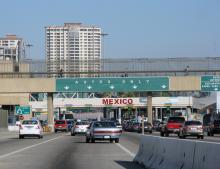
[Gilberto] shared about the man who had been deported at 51 years old after living in the U.S. for 50 years. Because this man’s parents came to the U.S. when he was 6 months old, he knew no other home than that of the U.S. When he landed in Tijuana, it not only felt like a foreign land, but he didn’t even know Spanish.
He shared about the U.S. military veteran who served in Iraq and Afghanistan but after serving his time in war zones, was deported to Mexico.
He shared about the man who had recently been deported and was now desperately trying to return to his wife and young children in the U.S.
With each story, the layers of isolation, dehumanization, and misunderstanding began to be peeled back. We had all heard the stories of deportation in the headlines, but none of us had come face to face with the humans behind the story.
Mesmerized by this sage who cast such a strong aroma of Jesus, we asked, “What would you encourage us to say to our congregations regarding the plight of the immigrant?”
He quickly responded with words I’ll never forget:
“Tell them to read their Bibles. Jesus told us to care for three types of people: the orphan, the widow, and the stranger. It’s been 2,000 years and we’re still doing a pretty bad job.”
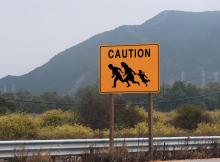
I am not a politician, so I’m not an expert on immigration policies.
I am not an economist, so I’m not an expert on the economic benefits or burdens of immigration.
But I am a public theologian. I try to understand how we can participate with God in setting things right, healing the world, and reconciling human beings with one another, with the world, and with God.

Sometimes a picture says it all.
Consider the 1963 picture of fire hoses and snarling police dogs in Birmingham, Ala., used against African-American students protesting racial segregation. Surely not our civil servants at their best.
Or the 1972 picture of the little girl in North Vietnam running terrified and naked with burning skin after South Vietnamese planes accidentally dropped napalm on Trang Bang, which had been occupied by North Vietnamese troops. The world then saw how war could hurt children.
Now, in 2014, we see citizens of Murrieta, Calif., turning back buses of women and children headed for a federal processing center, a day after Mayor Alan Long told them to let the government know they opposed its decision to move recent undocumented immigrants to the local Border Patrol station.

As immigration reform gains more and more bipartisan support in Congress, I am encouraged by our lawmakers’ positive steps forward, and I can’t help but think of my own story on immigration.
When I first started working on immigration, I was naïve. My wife and I started ministering to immigrants in 2005, and I thought our work would be all about sharing the Gospel of Christ.
I thought we would share in word and deed and our acts of service would show compassion. I was sure moving to the neighborhood would help make us equal participants in our community together, but certain things would make this nearly impossible.

I first heard about Ruth Carmina Alvarez from my friend Kit Danley. Kit is the director of Neighborhood Ministries, a Christian community in downtown Phoenix that, over the past several years, has become increasingly focused on advocacy for undocumented immigrants in their neighborhood. It’s through Kit and her son Ian that I have become involved in discussions between evangelical pastors and many of our elected officials as we all seek a just, humane repair of our tragically broken immigration laws.
Carmina, a longtime Phoenix resident who is married to a citizen and has a citizen child, used a friend’s ID to get a job at a local KFC. She was picked up on immigration-related charges last August for working with “bad documents” but was released and had no subsequent contact with authorities. But on April 1 police came to her house and arrested her. She had just finished eight months of chemotherapy for Stage 3 breast cancer and was still very sick, waiting for surgery to remove the tumor. Carmina was charged with a class 4 felony, which could mean deportation. But more importantly, if she pleaded guilty, she would have been ineligible for any status adjustment should a comprehensive immigration reform bill pass.

I became interested in the politics of immigration in about the most innocent way possible for a student at a conservative Christian college — good ol’ fashioned evangelism. Working on an “impact team” with a local Columbian pastor, we had a few nights of evangelism in large apartment complex that was almost exclusively Honduran. On the first night, I struck up a conversation with a (very) drunk man sitting on a park bench named Carlos. Over the next few months our relationship grew, and we became close friends. Eventually, he had an experience with Christ that changed his life and we came brothers. As members of the same body, this now meant that his burdens were my burdens (Rom 12:15; Gal. 6:2). As Carlos was an undocumented immigrant living in the south, this means that it sure didn’t take long for my burden to become immigration reform
Months after our initial meeting, I looked down at my phone and saw that Carlos was calling—but as I picked it up, the voice on the other line didn’t sound anything like my friend. Instead of a loud and happy voice calling me gringo, the voice was strained, quiet, emotional. I tensed up at the sound of his quivering voice — recognizing immediately that something serious was wrong.
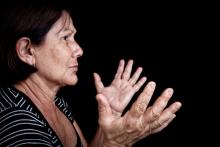
I recently looked out my front door and saw a woman sitting on the stairs of my patio. She was out of breath, sweaty, and had a large basket next to her full of cans and plastic bottles to be recycled. She looked desperately in need of some rest and refreshment. I’m pretty good at ignoring people in need (sadly), but when they come to your physical doorstep, I couldn’t imagine not stepping outside to check on this woman.
Opening our front door, she looked up at me with a bit of concern on her face thinking I might ask her to get off my patio. To calm her nerves, I simply sat down on the steps next to her and we exchanged warm smiles. Because she offered me a greeting in Spanish, I quickly realized she didn’t speak much English and I gave my best shot at speaking in Spanish. Over the next 10 minutes, we simply sat on my patio overlooking the main street of our neighborhood that runs in front of my house. Sometimes we talked, sometimes we just sat in comfortable silence. Her name was Conchetta. Finally, I asked if I could get her some food and a cold drink and she quickly said, “yes.”
After taking in some needed nourishment, Conchetta, offered me a warm smile filled with the richness of humanity and gratitude, and leisurely went back to work assembling the best of our neighborhoods “trash” so she could bring some life to her family.
Our faith community has spent a lot of time over the years becoming students of our neighborhood. As a result, we discovered that roughly 60 percent of our neighborhoods’ residents are Latino (most are Mexican because of our proximity to the border), and a high percentage of those are undocumented. In fact, it’s a safe assumption that my new friend, Conchetta, is undocumented.

As we quickly approach Holy Week in the Christian calendar, our attention turns increasingly to the passion and crucifixion of Jesus. According to the Gospel accounts, one of the last phrases that Jesus spoke while suffering on the cross is a recitation of the opening line of Psalm 22: “My God, My God, why have you forsaken me?”
Even Jesus, whom Christians hold to be the Son of God, experienced feeling forsaken by his Heavenly Father. And the words of the Psalmist go further, “My God, my God, why have you forsaken me? Why are you so far from helping me, from the words of my groaning? O my God, I cry by day, but you do not answer; and by night, but find no rest.”
As I reflect on the plight of the undocumented immigrant in the United States today, I wonder if the words of the Psalmist, echoed by Jesus on the cross, don’t hit a little too close to home.

The debate about immigration reform has been very productive in America over these past several years. And that debate has been won — by those who favor a common sense agenda for reform.
Two out of every three Americans now favor fixing our broken immigration system — two out of three! According to a recent report by the Public Religion Research Institute, 65 percent of Americans say that the U.S. immigration system is either completely or mostly broken. That same report found that 63 percent of Americans favor immigration reform that creates a pathway to citizenship, crossing party and religious lines. 60 percent of Republicans, 57 percent of independents, and 73 percent of Democrats favor a pathway to citizenship.
However, a minority of lawmakers — almost all white legislators in artificially gerrymandered white Congressional districts — is blocking a democratic vote on immigration reform. The Senate has already passed a bipartisan bill to reform the immigration system; written and forged by an impressive coalition of Republican and Democratic Senate leaders. And if a similar bill was put to a vote in the House of Representatives, it would also pass.
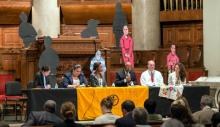
“I didn't come here because I wanted a job ... I came here because I wanted to live.” These words from an undocumented immigrant came early on in Church World Service's Summit on Immigration Reform in Washington, D.C. They could have easily been the words of Mary, mother of Jesus, as they fled to Egypt during his childhood.
“We just wanted to live.”
The reality is, as Christians, our tradition, our faith, our roots, are all tied up in an immigrant identity – or at least they should be. Reaching as far back as Adam and Eve, and Abraham and Sarah, we are a people who are on the move. We are typically found in places other than where we began. Even parts of the texts we use to guide us on our journey to/toward/with God were put together as the Israelites were living in a foreign land.
As Christians, we must recognize that we are truly a people with immigrant roots which reach all the way back to our Jewish spiritual ancestors. In that recognition, we need to learn to fully embrace the call of Deuteronomy to show hospitality to sojourners. It's a call that is about so much more than being welcoming and offering drink and food (although it does include those). The “hospitality” we are called to is one of seeing someone whom we may identify as “other” and loving them.
I'd make the argument that in his teachings, Jesus takes that concept a step further and tells us we shouldn't see them as other, we should see them as yet another image of God – another opportunity, another invitation, to not only share God's love but to know it more fully.

On April 27, 2011, 62 killer tornadoes ripped through Alabama, destroying homes, lives, and entire communities. Two weeks later, another disaster struck Alabama — HB56, the most draconian anti-immigrant law passed by any state in the nation. Instead of working to provide disaster relief for a stricken people, Alabama legislators fulfilled campaign promises to criminalize undocumented immigrants for simply setting foot in Alabama. Their intent was to make every aspect of immigrants’ lives so miserable that they would self-deport.
The politicians far underestimated the heart and spine of Alabama’s faith leaders. A new book published by Greater Birmingham Ministries, Love Has No Borders, is a testament to how faith leaders united with immigrants to challenge the nation’s most hostile anti-immigrant legislation. Our experience is critical to the current national debate on comprehensive immigration reform and challenges faith leaders anywhere to step up, speak up, and stand with immigrant communities in their struggle.
HB56 did everything its authors intended. It hurt undocumented immigrants where they lived, worked, worshiped, prayed, and went to school. HB56 created mass confusion and outright terror for people without papers in Alabama. Most immigrant families were faced with shattering decisions. Should they split their families up, leaving those who were citizens in Alabama and the rest fleeing to relative safety somewhere else? Or should they stay together in this place they call home, living in constant fear that a broken headlight or a roadblock would lead to detention and deportation?

"We all have a story to tell."
These are the words that will greet my new elementary students as they enter my classroom this year.
I will tell them my story: who I am, what I do, when I was born, where I have lived, why I am a teacher, how I came to our school.
I will tell them this story: When I was their age, I carried a tattered journal, a Papermate pen, and a pocket dictionary everywhere I went. I wrote about the people, places, and things I saw with my eyes, heard with my ears, smelled with my nose, tasted with my tongue, and felt with my hands. I put down on paper the ideas and feelings that were floating around in my head and my heart. I was nerdy (and still am) ... but I was me!
"Will you tell me your story?" I will ask them.

In the New Testament book of James, we are cautioned about the power of our tongues. “With the tongue we praise our Lord and Father, and with it we curse human beings, who have been made in God’s likeness. Out of the same mouth comes praise and cursing. My brothers and sisters, this should not be” (3:9-10).
This is a lesson that Iowa Congressman Steve King apparently needs to learn. On Sunday, Rep. King appeared on Meet the Press and stood by his outrageous assertion that:
“For every [undocumented immigrant eligible for the DREAM act] who’s a valedictorian, there’s another 100 out there that weigh 130 pounds and they’ve got calves the size of cantaloupes because they’re hauling 75 pounds of marijuana across the desert.”
Given the absurd and offensive nature of his statements, strong criticism swiftly followed. The Washington Post’s fact checker awarded it “Four Pinocchios,” which is a rating that is only applied to “whoppers.” House Speaker John Boehner previously denounced the comments as “offensive” and out of line with our society’s values.
Rep. King is known as an ardent opponent of immigration reform and has made controversial statements in the past, so his latest remarks are neither shocking nor a surprise.
But they should be.
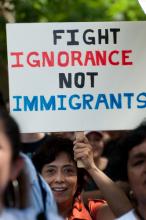
They have many labels. Undocumented immigrants. Illegal Immigrants. Illegal Aliens. Wetbacks. Jan Brewer, the governor of Arizona, recently suggested that most of them are “drug mules.” Some have even called them “terrorists.” But few are known by their real names or treated as people with real lives.
Most of them live at the edges of the society, under inhumane and dangerous conditions, often separated from their loved ones. For some it may be a choice. However, a vast majority of the 11 million undocumented immigrants in the U.S. are driven to such extremes by factors beyond their control — political crisis, drug-related violence, famine, or eviction from their own homes at gunpoint. Theirs is a story of displacement, of being forced to flee their homes and take risks few would under normal circumstances. They are victims, not the offenders they are often made out to be. Still, for many, it is a story of being treated by the border security as violent criminals, being stripped of their clothes and dignity and separated from their families and traumatized in detention centers. It is also a story of ostracizing and exploitation by parts of the society. The labels and stereotypes about them “otherize” them in ways that prevent their full participation in the society. Injustices like these are the reason why NETWORK’s Nuns On The Bus have been touring across the country speaking out for immigration reform.

I remember the first time I met someone without papers. They were 12 or 13, like me, and pretty unremarkable and brown. I can still feel the tension between my intense curiosity about this boy and my disappointment about him. Going from “I wonder if they have feelings like us” and “he doesn’t have a green card but does he have a mother who loves him” to “he’s kind of normal” and “this is not what I expected a real-life outlaw to look like” in a few quick minutes.
As life moved on and I made more friends, I met more people who were undocumented. I met grandmothers and little children and some college kids. My relationship with this issue kept transforming, from “I can say I have a friend who’s undocumented SO I KNOW WHAT I’M TALKING ABOUT, OK?” to “I have friends, some of whom don’t have papers, and I’d like to government to be nice to everybody.” The more undocumented immigrants I met, the less they seemed different at all.
It happened that way with abortion, too. And gay marriage. Start out with a simplistic interpretation of the Bible and a black-and-white opinion, befriend somebody at odds with that opinion, the opinion changes. Time after time. I was against women pastors —thanks to Paul and bad exegesis — until I realized that my mother had been spiritually leading people for 20 years and most of them had turned out OK.
I’m sure that if I run for president in 20 years, somebody is going to find a paper I wrote for my Biblical Interpretation class decrying the moral state of our socialized medical system, contrast that with my current view, and label me a flip-flopper. And they would be right, which would have worried me three years ago. But I’ve met some flip-floppers since then, and they’re pretty decent people. So I’m okay with that now.
To be honest, I don’t really trust people who have had the same opinions their entire lives. Which is probably why I don’t trust much Evangelical theology, these days. I think it’s natural to have your views about the world change as you experience more of the world, and I wish it were easier to be honest about that when it happened. I wish it were encouraged.
Despite the progress on immigration reform being made in the Senate, this week offered an unfortunate reminder of the uphill battle any legislation faces in the House of Representatives.
During it’s consideration of legislation funding the Department of Homeland Security, the House passed an amendment, authored by Iowa Republican Rep. Steve King, to defund the administration’s efforts of prosecutorial discretion. Specifically, it would require DHS to deport young, undocumented immigrants known as “DREAMers.” The amendment also puts at risk anyone who qualifies for prosecutorial discretion under the June 2011 John Morton Memos while in deportation proceedings.
Essentially, this amendment would categorize all undocumented immigrants aside violent criminals who must be deported if encountered by law enforcement, regardless of their circumstances or contributions.

What I have heard after visiting 18 cities in six weeks is that people around the country believe that nothing can happen in Washington, D.C. They are basically right. So I am very grateful today to report the one exception.
On Tuesday, the Senate Judiciary Committee approved a new comprehensive immigration reform bill with a bipartisan vote. Did you hear that: “bipartisan.” Amid heartbreaking news of the destruction, grief, and heroism we have seen in Moore, Okla., from one of the worst tornados in American history, millions of Americans found a reason to be hopeful.
This historic immigration bill now goes to the full Senate, where it has a real chance of passing and changing the lives of 11 million aspiring Americans. These are the “strangers” talked about throughout the Bible, and about whom Jesus said, in Matthew 25: how we treat them is how we treat him. That realization has caused a literal biblical conversion in the evangelical Christian community, which with the help of law enforcement officials and business leaders has done the impossible — changed Washington, D.C.
Self-interests, special interests, and even conflicting principles all put this life-changing proposal in grave danger. But in a town defined by gridlock, a group of eight senators crafted a bipartisan proposal that passed with only minor change. The bill reflects agreements reached by the AFL-CIO and Chamber of Commerce; imagine that. It isn’t perfect and no single legislator got everything she or he wanted, but the key elements that many of us have been fighting for are intact. That really is a triumph of the common good.
Now, I am asking you to write your senators and ask them to support this bill on the Senate floor.

The night was cold and dark as the family approached the border. Ahead of them were miles of desert that would test their will and drain their stamina. What they were doing defied the law. But they were a family, and families will do anything for the sake of their children.
The law they defied was that of Herod. The family: Joseph, Mary and the Christ-child.
As Christians prepare to celebrate Easter, let us remember that the life that ended on the cross began on the road. This Easter, let us remember that Christ the Savior began his life as an immigrant, fleeing the land where he was born to escape Herod’s wrath.
Easter is a holiday of new beginnings. It welcomes a new season. It is a time to start fresh. At the heart of Easter is a magnificent reservoir of grace. Of this holiday, Katherine Lee Bates reflected, “It is the hour to rend thy chains, the blossom time of souls.” Easter is a time to set people free, fix things that are broken, watch souls blossom — all for glory of the risen Christ.

Introduction from Lisa Sharon Harper: Every once in a great while you meet someone who carries in their very body the scars of injustice that we talk about so much at Sojourners. These scars leave permanent reminders of the profound need for every follower of Jesus to follow him in word and deed. It is my great pleasure to introduce you to my friend and colleague, Ivone Guillen. As Sojourners’ Immigration Campaigns and Communications Associate, Ivone has worked tirelessly for the passage of just immigration reform for two years. As a formerly undocumented immigrant, she bears the scars of our unjust immigration system and has experienced the healing that came from changes in immigration policy last year. Please read Ivone’s story. It reflects the stories of millions of people in church pews across the country; people made in the image of God, people waiting for that image to be fully recognized and set free inside our borders.
I remember clearly the day I heard the announcement on deferred action for childhood arrivals (DACA) as I felt an overwhelming surge of emotions in that one moment. A path to opportunity, however fragile and short-term, had finally been created for undocumented young people wanting to become full members of American society.
As I sat on the sofa on the morning of June 15 in front of the television and next to my computer, I felt anxious, excited, and dazed at the same time. There I was, listening to one of the biggest announcements ever made in my lifetime, and it directly impacted me. It was a surreal moment since I had been working with the advocacy community for almost two years and had seen difficult developments take place at the state level on the issue. Then and there, I felt that all of my work was paying off and that change could be achieved with enough persistence and pressure. It was a moment that most people wish to live and see, especially those who have worked in the movement for decades but seldom experience the ultimate triumphs of slow processes.

One angry constituent asked repeatedly where the “dang fence” that McCain had promised was. The senator turned to a chart illustrating how much fence had been constructed (hint: it’s a lot), and the man shot back that it was not a fence. “Oh, it’s not a fence?” McCain challenged. “OK, it’s a banana. We put up a banana with about $600 million of appropriations.”
Wow. Talk about laying down the law.
McCain even alluded to the work of the faith community on changing the message on immigration. Why are we not going to deport immigrants who have been living in the country for over 40 years? “Because we are a Judeo-Christian nation,” McCain affirmed. Mass deportation is contrary to our values.